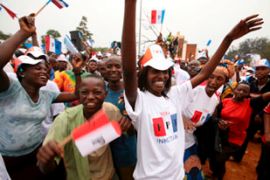Rwanda’s Kagame ‘expects poll win’
Lack of opposition candidates likely to leave Paul Kagame as president.

“I have no reason not to be confident,” he told reporters as he cast his ballot on Monday.
Hundreds of other voters turned up to vote in what is Rwanda’s second general election since the genocide of 1994.
Economic success
Rwanda has been praised for its economic reforms since the genocide – which saw hundreds of thousands of minority Tutsis massacred – ended.
Since Kagame, a Tutsi, took power in 2000, Rwanda has attracted growing foreign investment.
“I think those achievements will be speaking by themselves,” Kagame said.
Only one independent candidate is standing in the election, while the two other parties to field candidates in the polls – due to end on Thursday – are the Social Democratic party and the Liberal party.
Both backed Kagame in the 2003 elections, which saw him re-elected with 95 per cent of the vote.
The opposition in the small central African country is made up of about a dozen parties which have been in exile since the end of the genocide and did not field candidates.
The United Democratic Forces (UDF), a coalition of Brussels-based opposition movements, criticised the poll.
“The UDF are of the view that so long as one political party, the RPF, monopolises all the state machinery, decides which party or individual can contest elections, seals off all the country during the electoral process, elections will amount to a smoke screen,” it said in a statement last month.
Gender equality
The elections are for 53 parliamentary seats out of 80. The remaining 27 will be allocated through indirect elections on September 16-18, with 24 seats reserved for women, two for youth representatives and one for a representative of the disabled.
This hybrid electoral system has made Rwanda one of the only countries in the world with a near gender-equal parliament – in the outgoing house, 48 per cent of the members are women.
The proportion of women in politics is also a result of the imbalance in the country’s population – so many men having been killed in the genocide and others having fled.